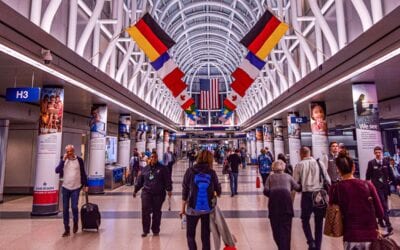
From a passenger’s point of view, 2012 was on of the most momentous since deregulation. Airline consumers reached more milestones and the Department of Transportation (DOT) put into effect more passenger protections than in the history of the department.
Here are a dozen of the changes that will enhance passenger protections when traveling by air.
1. Hold a reservation for 24 hours without payment, or cancel a booking without penalty, for 24 hours after the reservation is made, if passengers make the reservation one week or more prior to a flight’s departure date.
After years of each airline developing their own rules, some of which didn’t allow for any error or changes without a payment of hefty change fees, DOT put a stop to the airline abuse. Now, all passengers on all airlines operating in the USA have a 24-hour period within which to change or cancel reservations as long as the reservation was made one week or more prior to scheduled departure.
2. Full fare advertising
Airline advertisements must include all mandatory taxes, surcharges and fees. The airlines are still weeping wailing about the need to be honest, however, they lost in district court and are expected to lose again in their petition to the Supreme Court to go back to misleading consumers.
On January 22nd flights from Boston to London were listed on websites for $65*. The asterisk was important because it noted in the fine print that this was the one-way airfare based on round-trip and this price did not include fuel surcharges, fees and taxes.
The least expensive price for this $65 airfare was in reality, more than $750 round trip. I still can’t believe that the airlines believe it is acceptable to advertise a $130 round-trip price when the final cost is $750+.
The current rule, barring a Supreme Court ruling striking down the DOT rules, says that the final $750+ full price must be the advertised price. Airlines can break out the airfare, taxes, fees and surcharges beneath the price.
3. More enforcement — millions of dollars worth
DOT has beefed up its enforcement of these new rules. Already, airlines, both foreign and domestic have paid millions of dollars in fines.
4. Advisory Committee for Aviation Consumer Protections
A result of the FAA Reauthorization Bill that was passed after 22 or 23 extensions (I lost count) included legislation that firmed up the basis of DOT three-hour tarmac-delay rule and it created a new advisory committee. The committee, made up of one representative of state government that works to protect consumers, a consumer representative, an airline representative and an airport representative has already met and filed their initial recommendations to the Secretary of Transportation.
5. New complaint procedures
New consumer complaint procedures were recommended to DOT by ACACP. Now when complaints are filed with the department, consumers be informed whether their complaint dealt with a policy issue or should be settled as a customer service issue with the airlines, they will see what was forwarded to airlines and will hear from the airlines with a substantive response within 60 days.
6. Contract of Carriage Definitions & FAQs
Another ACACP recommendation was the definition of terms that airlines use in their contracts of carriage and series of frequent asked questions. DOT is in the process of developing these new pages for their website. It is expected that by springtime, it will be far easier for consumers to easily call up DOT rules regarding bumping and lost luggage on smart phones. This change will allow passengers to have the actual rules when negotiating with airlines regarding denied boarding compensation.
7. Increased compensation to passengers bumped from oversold flights
The fines were doubled when airlines bumped passengers. Plus, rules were strengthened to allow to be awarded cash rather than airline scrip. Here is the new rule. Note one set of compensation for delays of between one and two hours (one and four hours for international fights); an other set for delays of more than two hours (four hours for international flights). Plus, compensation must paid to passengers flying on tickets paid for with frequent flier miles.
Compensation shall be 200% of the fare to the passenger’s destination or first stopover, with a maximum of $650, if the carrier offers alternate transportation that, at the time the arrangement is made, is planned to arrive at the airport of the passenger’s first stopover, or if none, the airport of the passenger’s final destination more than one hour but less than two hours after the planned arrival time of the passenger’s original flight; and
Compensation shall be 400% of the fare to the passenger’s destination or first stopover, with a maximum of $1,300, if the carrier does not offer alternate transportation that, at the time the arrangement is made, is planned to arrive at the airport of the passenger’s first stopover, or if none, the airport of the passenger’s final destination less than two hours after the planned arrival time of the passenger’s original flight.
8. Almost no long tarmac delays and expansion to international flights
By virtue of the tarmac-delay rules put into effect in 2011, there were virtually no extended tarmac delays in 2012.
9. A hotline that doesn’t work — what Congress wanted does no good
Consumers have a spanking new hotline for customer service in the newest aviation funding legislation, but it doesn’t work yet, nor does it go to the correct place to get help. I guess consumers can claim that Congress’ heart was in the right place, but its legislation missed the mark. The ACACP will discuss this issue in the coming year.
10. A start for NextGen
The FAA Reauthorization Bill provided more funding for the development of the nation’s new air traffic control system. With this funding, the new satellite based system can start to be deployed. Eventually, this will me money savings and time savings for consumers using airline transportation and significant savings for goods and services shipped via air freight.
11. Semi-baggage fee disclosure
DOT as part of their 2011 rulemaking mandated that airlines publish on their websites all of their ancillary fees. This page is found through a prominent link from the airline website homepage. The only problem is that these “disclosures” do not take into account elite frequent flier exemptions or exemptions for some fees based on the credit card used to purchase airfares.
Then again, some notification is better than nothing. The ACACP will be involved with DOT in a new rulemaking that should eventually force airlines to disclose the full cost of airline transportation so that it can be compared across airlines and consumers can find the best deals.
12. Refund baggage fees if luggage lost
Airlines collected about $1 billion in baggage fees this past year. According to their rules there baggage fees are non-refundable. DOT put a stop to their claim of total non-refundability. New DOT rules put into effect in 2012 say that if the airlines lose your luggage, they must refund the baggage fees charged to check that baggage.

Charlie Leocha is the President of Travelers United. He has been working in Washington, DC, for the past 14 years with Congress, the Department of Transportation, and industry stakeholders on travel issues. He was the first consumer representative to the Advisory Committee for Aviation Consumer Protections appointed by the Secretary of Transportation from 2012 through 2018.



